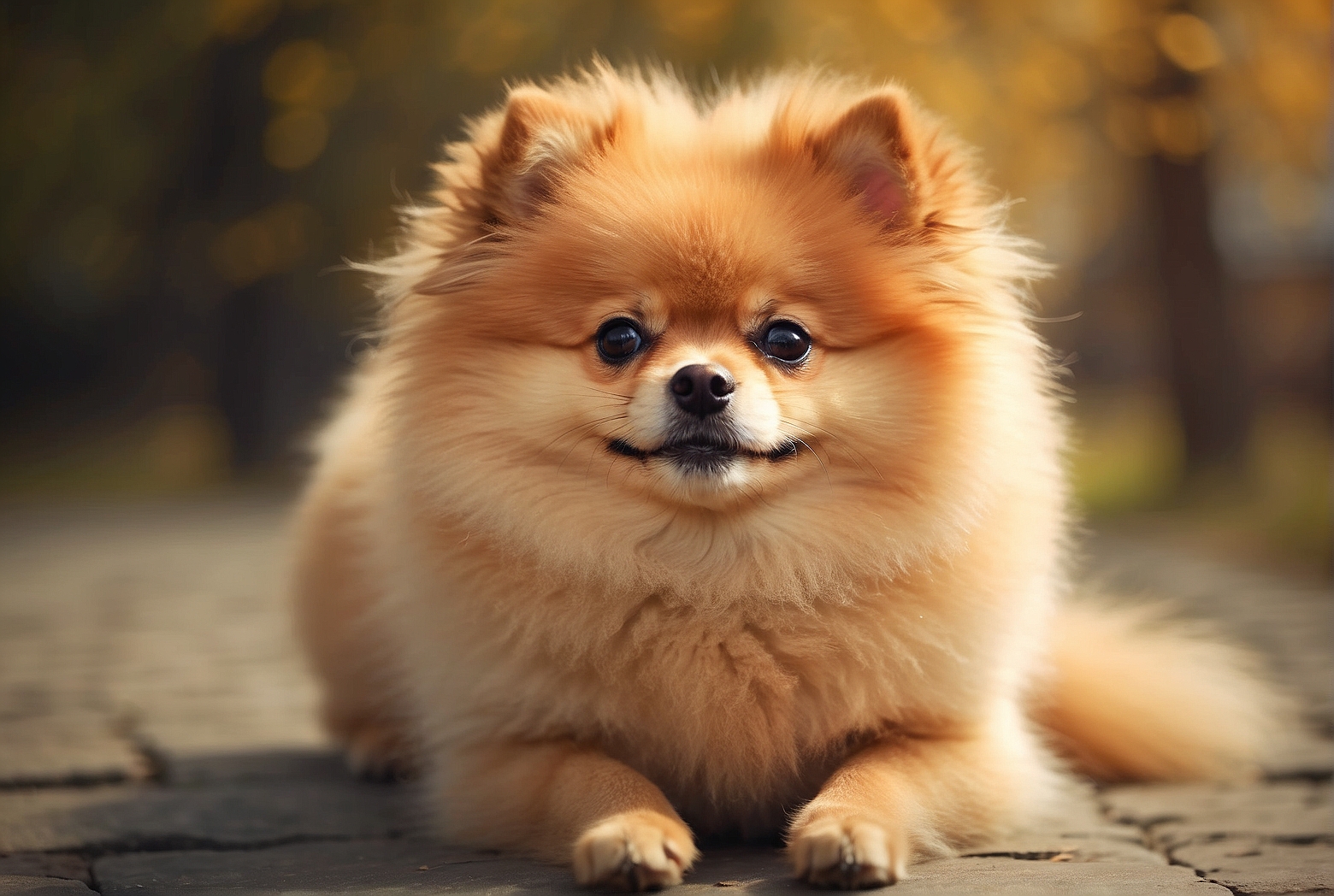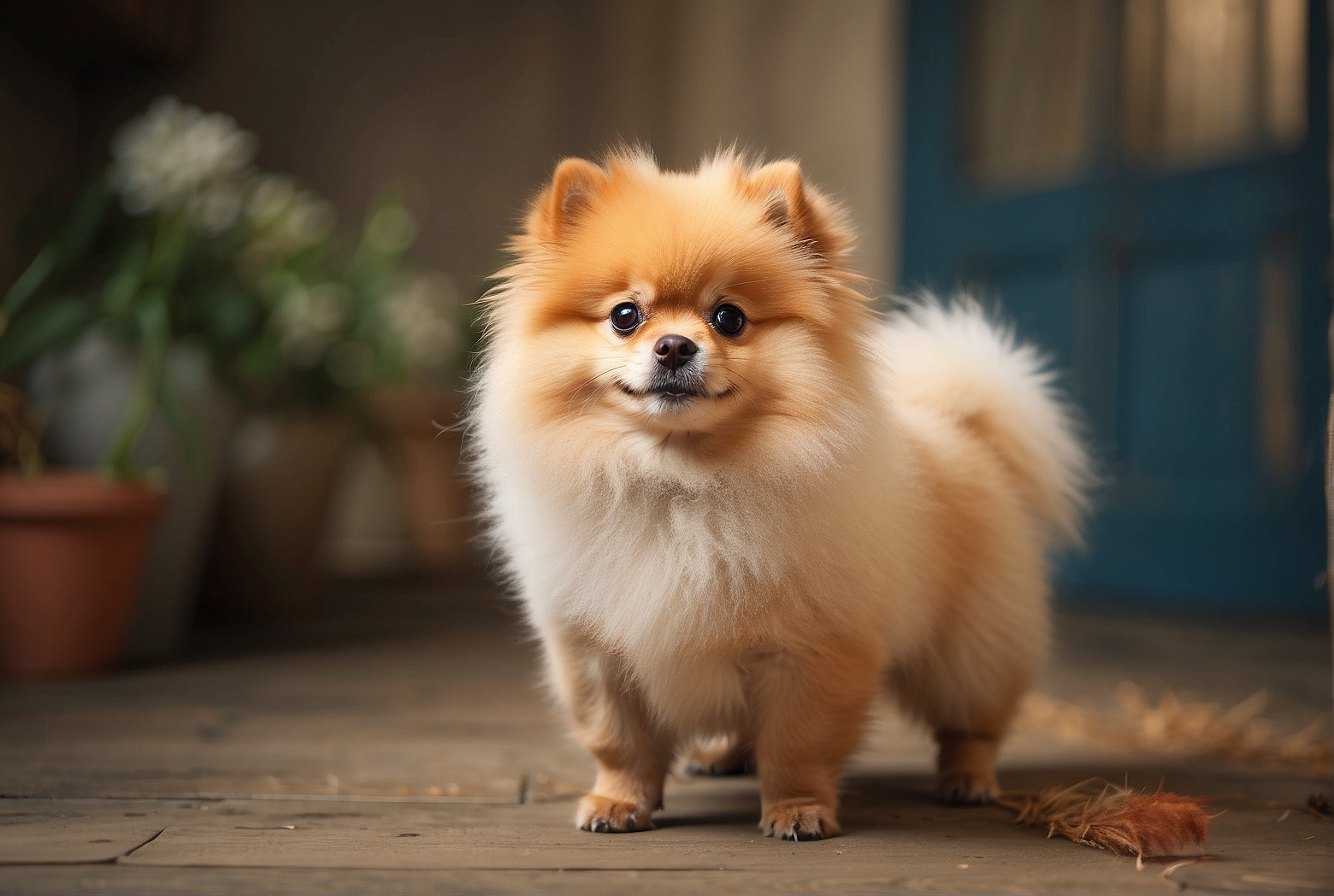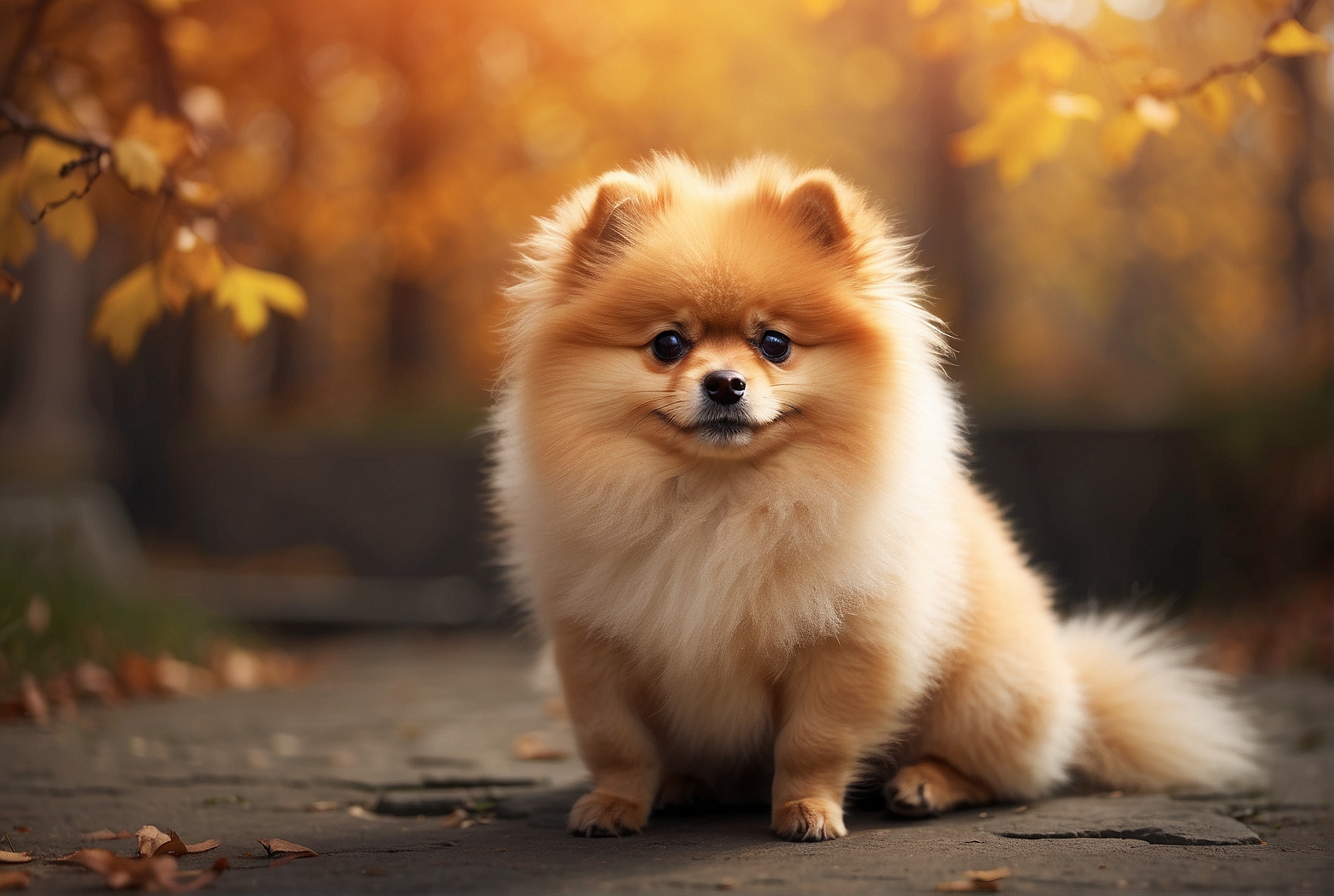If you’ve ever wondered what the temperament of a Pomeranian is like, look no further. In this article, we’ll provide you with a glimpse into the world of these adorable little furballs. From their lively and outgoing nature to their unwavering loyalty, Pomeranians are bound to bring joy and companionship into your life. So, if you’re considering adding one to your family or simply curious about this delightful breed, keep reading to discover what makes the Pomeranian temperament so unique and lovable.
General Overview
Size and Appearance
Pomeranians are small and compact dogs with a distinctive fox-like face. They typically weigh between 3 to 7 pounds and stand about 6 to 7 inches tall at the shoulder. Despite their small size, they have a sturdy build and a plumed tail that arches over their back. Pomeranians come in a variety of coat colors and patterns, including orange, black, white, sable, and chocolate. Their luxurious double coat consists of a dense undercoat and a longer, harsh-textured outer coat.
Origins and History
The Pomeranian breed originated in the Pomerania region of present-day Poland and Germany. Originally, Pomeranians were much larger than they are today and were primarily used for herding sheep. It wasn’t until the 19th century that the breed was selectively bred for smaller size and introduced to the United Kingdom. Queen Victoria played a significant role in popularizing Pomeranians, as she fell in love with the breed during her visit to Italy and brought several of them back to England. From there, their popularity spread across Europe and eventually to the United States.
Popular Breeds
Pomeranians have gained immense popularity worldwide due to their adorable appearance and charming personality. Some of the most well-known breeds include Boo, the “World’s Cutest Dog,” and Jiffpom, a social media sensation with millions of followers. The Pomeranian’s small size and friendly demeanor have made it a beloved companion for people of all ages.
Pomeranian Temperament
Friendly and Affectionate
Pomeranians are known for their friendly and affectionate nature. They love to be the center of attention and enjoy being around people. Pomeranians are loyal and devoted to their families, forming strong bonds with their owners. They are often described as “little balls of love” and are well-suited for individuals or families seeking a constant companion.
Intelligent and Curious
Despite their small stature, Pomeranians possess a high level of intelligence. They are quick to learn and pick up commands, making them relatively easy to train. Pomeranians are naturally curious and enjoy exploring their surroundings. Their intelligence and curiosity make them excellent companions for owners who are interested in providing mental stimulation and engaging activities.

Lively and Energetic
Pomeranians have a lively and energetic personality. They love to play and have a seemingly limitless amount of energy. Daily exercise, such as walks or playtime in a securely fenced yard, is essential to keep them happy and fulfilled. Pomeranians have a playful demeanor and enjoy interactive toys and games. Their enthusiasm and zest for life are contagious, making them a joy to have around.
Inquisitive and Alert
Pomeranians have a keen sense of curiosity and are highly alert. They are always on the lookout for new sights, sounds, and smells in their environment. This inquisitiveness makes them excellent watchdogs, as they will not hesitate to alert their owners to any potential danger. Pomeranians make great apartment dogs due to their compact size and alert nature, which makes them perfect for keeping an eye on their surroundings.
Social Behavior
Bonding with Family
Pomeranians are known for their strong attachments to their families. They thrive on human companionship and want to be involved in all family activities. Whether it’s sitting on your lap while you watch television or joining you on a hike, Pomeranians want to be an integral part of your life. They enjoy cuddling and will happily curl up next to their favorite human for a cozy evening.
Interaction with Children
Pomeranians can be great companions for families with older, respectful children. They have a friendly and playful nature, and when properly socialized, they can get along well with kids. However, due to their small size, they are more delicate and prone to injury, so close supervision is necessary to ensure the safety of both the dog and the child. Teaching children how to properly interact with and handle a small dog is crucial to maintain a harmonious relationship.
Compatibility with Other Pets
Pomeranians generally get along well with other pets when properly introduced and socialized. However, their small size and assertive nature may occasionally lead to instances of “small dog syndrome,” where they may display dominant behaviors towards larger dogs. It’s essential to provide proper guidance and socialization to ensure smooth interactions between Pomeranians and other animals in the household.
Tendency for Separation Anxiety
Pomeranians often form strong bonds with their owners, which can lead to separation anxiety when left alone for long periods. They thrive on companionship and can become distressed if left alone for extended periods. It’s important to gradually acclimate your Pomeranian to being alone and provide mental stimulation, such as puzzle toys or leaving the radio on, to alleviate their anxiety. Consider enlisting the help of a professional dog trainer or behaviorist if separation anxiety becomes a significant issue.

Training and Intelligence
Trainability and Obedience
Pomeranians are intelligent dogs and are eager to please their owners, making them generally trainable. However, they can be independent and strong-willed at times, so consistent and positive reinforcement-based training methods work best with this breed. Early socialization and basic obedience training are vital to ensure that Pomeranians grow up to be well-behaved and confident dogs.
Problem-solving Skills
Pomeranians have excellent problem-solving skills and can quickly figure out how to get what they want. This can be both a positive and challenging aspect of their temperament. They may use their intelligence to manipulate situations or find creative solutions to obstacles. It’s important for owners to provide appropriate mental stimulation and engage in interactive play to channel their problem-solving skills in a positive direction.
Impressions of Independence
While Pomeranians may have a reputation for being independent, they are still highly reliant on their human companions. They thrive on attention and reassurance from their owners, and their independence is more in terms of exploring their surroundings than being emotionally self-sufficient. Pomeranians do best when they have a strong bond with their owner and feel secure in the relationship.
Exercise and Mental Stimulation
Physical Activity Requirements
Despite their small size, Pomeranians have moderate exercise needs. They benefit from daily walks and playtime to burn off excess energy. However, it’s important to remember their physical limitations and not overexert them, especially during hot weather or extreme temperatures. Regular exercise helps keep their weight in check and promotes good overall health.
Mental Stimulation Needs
Pomeranians have a sharp mind and need regular mental stimulation to prevent boredom and destructive behaviors. Interactive toys, puzzle feeders, and training sessions can help keep their minds engaged and alert. Engaging in activities that provide both physical exercise and mental stimulation, such as obedience classes or agility training, is an excellent way to keep your Pomeranian mentally sharp and physically fit.
Suitable Exercise Options
Pomeranians are versatile when it comes to exercise options. They can enjoy brisk walks, short runs, or playtime in a securely fenced yard. Indoor play, such as fetch or hide-and-seek, can also help burn off excess energy during inclement weather. It’s important to tailor their exercise routine to their individual needs and age, and always be mindful of their physical limitations.
Grooming and Maintenance
Coat Care and Shedding
Pomeranians have a dense double coat that requires regular care to keep it healthy and mat-free. They are heavy shedders, especially during seasonal changes. Daily brushing helps remove loose hair, prevent mats, and maintain the coat’s natural luster. Regular grooming sessions also give the opportunity to check for any skin issues, ticks, or fleas.
Regular Grooming Practices
In addition to daily brushing, Pomeranians require regular grooming practices to keep them looking their best. This includes trimming the hair around their feet, ears, and tail to maintain a neat appearance. Bathing should be done as needed to keep their coat clean without over-drying the skin. Regular grooming also includes checking and cleaning their ears, as Pomeranians are prone to ear infections.
Dental Hygiene
Dental hygiene is an essential aspect of Pomeranian care. Daily teeth brushing with dog-friendly toothpaste helps prevent tartar buildup and gum disease. Regular dental check-ups with a veterinarian can also identify any potential dental issues early on and ensure proper oral health. Dental chews or toys designed to promote dental hygiene can also be incorporated into their routine.
Nail Trimming
Regular nail trimming is crucial for Pomeranians to prevent overgrowth and discomfort. If left unchecked, long nails can cause walking difficulties and lead to paw injuries. It’s important to get your Pomeranian used to the process of nail trimming from an early age. If you are unsure about trimming their nails yourself, seeking the help of a professional groomer or veterinarian is recommended to ensure safe and proper nail care.
Health Concerns
Common Health Issues
Pomeranians are generally healthy dogs, but like all breeds, they are prone to certain health issues. Dental problems, such as tooth loss and gum disease, are prevalent due to their small mouths and crowded teeth. Patellar luxation, where the kneecap slips out of place, is another common condition in Pomeranians. Other health concerns can include tracheal collapse, heart disease, and eye problems like cataracts and dry eye syndrome.
Potential Genetic Conditions
Pomeranians are susceptible to a few genetic conditions, such as hip dysplasia and Legg-Calve-Perthes disease. These conditions affect the hip joints and can cause pain and mobility issues. Responsible breeders will conduct health screenings and genetic testing to minimize the risk of passing on these conditions to offspring. It’s crucial to choose a reputable breeder who prioritizes the health and well-being of their Pomeranians.
Lifespan and Age-related Conditions
On average, Pomeranians have a lifespan of 12 to 16 years. As they age, they may become more prone to age-related conditions, such as arthritis and cognitive decline. Regular veterinary check-ups, a balanced diet, and appropriate exercise can help maintain their overall health and detect any potential issues early on. Providing a comfortable and stimulating environment for senior Pomeranians is essential to ensure their well-being in their golden years.
Preventive Measures
To ensure the good health of your Pomeranian, preventive measures can be taken. Regular vaccinations, preventive medications for fleas and ticks, and routine deworming are essential for their overall well-being. Maintaining a healthy weight through a balanced diet and regular exercise can also help prevent certain health issues associated with obesity. Early detection and treatment of any health concerns are crucial, so don’t hesitate to consult with a veterinarian if you notice any unusual symptoms or behaviors.
Socialization and Training Tips
Early Socialization Importance
Early socialization is crucial for Pomeranians to develop into well-rounded and confident dogs. Introducing them to a variety of people, animals, and environments from a young age helps them feel comfortable and confident in different situations. Socialization helps prevent fear or aggression issues and lays the foundation for a well-adjusted adult Pomeranian.
Positive Reinforcement Methods
Pomeranians respond best to positive reinforcement-based training methods. Rewarding desired behaviors with treats, praise, or playtime helps motivate them and encourages them to repeat the behavior. Harsh training methods or punishment can lead to fear or anxiety, which can hinder their training progress and damage their overall temperament. Consistency, patience, and kindness are key when training a Pomeranian.
Consistent Training Approach
Pomeranians thrive on consistency and routine. Using a consistent training approach helps them understand what is expected of them and makes training sessions more effective. Establishing clear boundaries and rules, and enforcing them consistently, helps Pomeranians feel secure and confident in their environment. Consistency helps build trust between the owner and the dog, which is crucial for a well-behaved and happy Pomeranian.
Suitability for Families
Apartment Living vs. House
Pomeranians are well-suited for apartment living due to their small size and moderate exercise needs. However, it’s important to provide them with regular exercise and mental stimulation within the confines of the apartment. House living is also suitable for Pomeranians as long as the backyard is securely fenced to prevent them from escaping. Pomeranians adapt well to various living environments, as long as their social and exercise needs are met.
Compatibility with Elderly
Pomeranians can be excellent companions for elderly individuals. Their small size makes them easy to handle and care for, while their affectionate nature provides companionship and emotional support. Pomeranians can also help encourage physical activity and provide a sense of purpose and routine for older individuals. However, it’s essential for elderly owners to ensure they can meet the dog’s exercise and grooming needs or have assistance in doing so.
Families with Kids
Pomeranians can be a suitable choice for families with older children who understand how to interact with small dogs respectfully. With proper socialization and supervision, Pomeranians can form strong bonds with children and provide years of joyful companionship. It’s important to teach children how to approach and handle a small dog gently, ensuring the safety of both the child and the dog.
Considerations for Busy Individuals
Busy individuals need to consider the time and commitment required to provide proper care and companionship for a Pomeranian. Pomeranians thrive on human interaction and attention, and leaving them alone for long periods can lead to separation anxiety and destructive behaviors. If you have a busy lifestyle, it’s crucial to have a plan in place to ensure your Pomeranian’s socialization, exercise, and mental stimulation needs are met. This may involve enlisting the help of a dog walker or daycare or arranging playdates with other dogs.
Conclusion
In conclusion, Pomeranians are small dogs with a personality that belies their size. They are friendly, affectionate, and intelligent companions that bond closely with their families. Their lively and energetic nature makes them a delight to be around, while their inquisitive and alert temperament makes them excellent watchdogs. With consistent training, socialization, regular exercise, and proper grooming, Pomeranians can thrive in various living environments and bring joy to individuals and families alike. If you are looking for a loyal and charming companion, the Pomeranian may just be the perfect breed for you.
